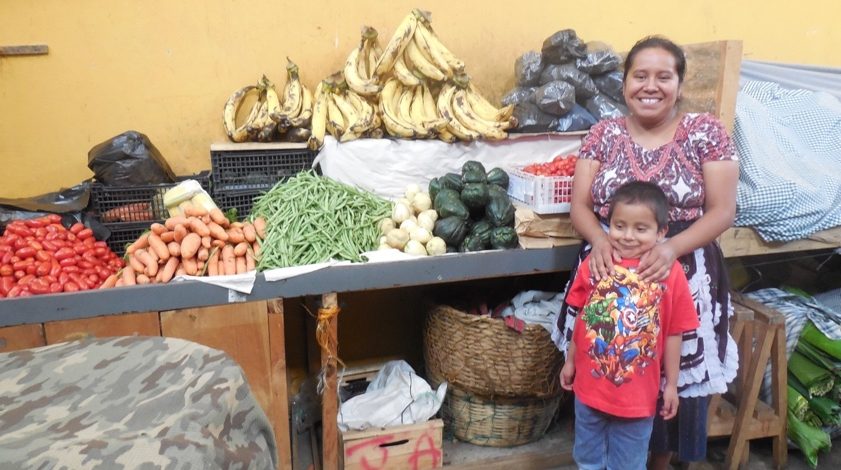Tell Me Why . . .
A Monthly Blog by Founder Bob Graham
 I write about helping low-income businesswomen in Guatemala to make more money and create prosperity. Join me as I explore topics about leveling the playing field for women in business. What works? What doesn’t? Why is investing in women just about the best investment on the planet?
I write about helping low-income businesswomen in Guatemala to make more money and create prosperity. Join me as I explore topics about leveling the playing field for women in business. What works? What doesn’t? Why is investing in women just about the best investment on the planet?
This month’s blog is WHY ONLY WOMEN?
In the midst of all the “W” questions (who, what, where, when, and why) about Namaste’s business training work with low-income micro-entrepreneurs in Guatemala, someone inevitably asks: “Why do you only work with women?”

They are our best hope to link short-term results with long-term outcomes!
We know we have a superior model for increasing women’s business income. (I live in both San Francisco and in Guatemala and love bringing the world of data analytics to the world of micro-economics, so we have the facts and figures to back that up.) We work hand-in-hand with our aspiring micro-entrepreneurs in getting great short-term results.
But what about the long-term outcomes? Globally, many of the best-intentioned development projects fall apart after the program implementer leaves the scene and stops providing important supplies such as medicines, seeds, fertilizers, water purification devices, stoves, and so forth.
There are two major factors in our program that facilitate moving short-term results to the long-term: first, it is knowledge-based and therefore internalized by the women, and secondly, the women uniformly invest their new-found profits in the family, thereby benefiting their children in both the now and in the future.
A study in Guatemala showed that women are 14 times more likely than their male companions to invest extra income in household expenditures such as food, medicines, and shelter that benefit children. Come again, 14 times? Yes, the study showed that it took about $166 in the hands of the male of the household to get the same child weight and height increase as $12 in the hands of the woman. Women are vastly superior in investing in the future – in this case, through their children – because they uniformly spend 90 – 95% of increased money on the family as compared to less than 10% by males.
Working with women exclusively is Namaste’s “Secret Sauce”.
Here’s another thing – women work to see that their children stay in school longer, especially the girls. Our clients average 4.5 years of schooling, and every day they see that their contemporaries with more years of education do better in their businesses, have better homes and clothes (and some would say “better husbands”). Women always tell us that they want better lives for their children and have a fierce determination to make that dream come true.
Yes, all of our clients have dreams, and that’s why they make better students. They are much more likely to attend peer-based training sessions and repay their loans than men. Need I also mention that elevating a woman’s income (along with the hand-in-hand increases in self-esteem, confidence, and leadership position in the family and community) is the ultimate weapon against machismo and its evils of discrimination and subjugation of women?
Thus, the outcomes are exponential.
Think of the Namaste business woman-in-training as being at the center of concentric rings reaching out to her immediate family, then to her extended family (because in Guatemala the extended family is the most basic unit of organization), then to her community and ultimately to civil society as a whole. Everybody benefits when women become more independent and have greater resources. No matter what your personal interest may be – poverty, family planning, health, water, nutrition, women’s empowerment, social and economic justice – these women have something for you.
Want to help? You can stand in the middle of those concentric rings alongside that woman making dreams come true by contributing to Namaste at namastedirect.org today!
Blog Outreach Request
Do You Have a Question?
I’m looking for stimulating and challenging Questions! Send me one and I will send you an answer, either via email or by publishing it with my thoughts on the Tell Me Why . . . website.
I am especially interested in your questions about Namaste and its work with women micro entrepreuners in Guatemala and about women’s economic empowerment generally. I will also entertain questions about Guatemala, a country I first visited in 1973.
 And, guess what! If I publish your question on our website, I’ll send you a free copy of my book, 50 – 50 at 50, my story deciding at age 50, to devote 50% of my money, time and energy to helping others.
And, guess what! If I publish your question on our website, I’ll send you a free copy of my book, 50 – 50 at 50, my story deciding at age 50, to devote 50% of my money, time and energy to helping others.

I have a question, Bob, though it may be beyond the scope of a blog post to answer, as it’s a pretty deep sociological issue. It’s not hard to understand why women do so well, given their commitment to their children and families. But why are the men in these communities so uniformly and wildly different in this regard?
Hi Ron,
According to an article published by the Institute for Family Studies, men believe marriage and families require a substantial increase in responsibilities and a greater possibility of financial loss.
From that, one can surmise that once men are in family situations, some of them are predisposed to see their experience as “lots of responsibilities and expenses that I don’t like” and thus fail to fully commit to the welfare of the family.
To add some geography to that general, non-culturally mediated statement, I believe that machismo plays a role in the male not acting with the same commitment as the female in family dynamics.
There is an excellent examination of male behavior and machismo in Latin America at:
https://www.ipsnews.net/2003/04/latin-america-the-traditional-model-of-masculinity-or-machismo/
One of the statements that caught my eye was:
“The cultural identity of ”men is built on a relationship of ‘opposition’ to women, and they must prove themselves to be men in the eyes of their peers,” said one of the authors of the study, Chilean psychiatrist Rodrigo Aguirre.
The indicates that machismo is learned behavior and is therefore cultural. Of course, it’s learned behavior and thus can be unlearned, but it’s an uphill battle.
One of the underpinnings for “Why Only Women” that I listed is that women are more likely to repay their loans. Here is a study in Bangladesh that confirmed my claim:
https://www.aeaweb.org/conference/2014/retrieve.php?pdfid=642
One of the startling assertions in the Abstract is that
“women are ‘naturally’ better credit risks than men in microcredit.” In other words, culture does not play a role in this positive behavior.
Whether it’s nature or nurture, I’ll take the woman over the man anytime!
Best, Bob
Thanks for the response, Bob. The IPS News article was interesting and sad. Amazing how a way of being that is so limiting and destructive can become so entrenched and universal in a culture. Perhaps seeing their female counterparts do so well and make money – with assistance from organizations like NamasteDirect – will convince more men to self-reflect and eventually change their machismo mindset and behavior. As you say, “…it’s learned behavior and thus can be unlearned….”